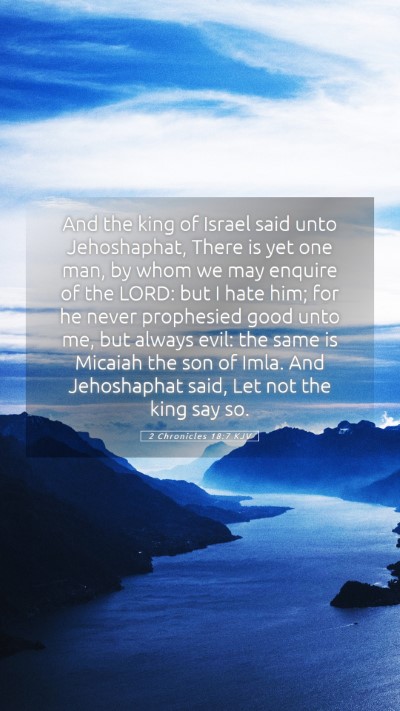Understanding 2 Chronicles 18:7
The verse 2 Chronicles 18:7 reads: "And the king of Israel said unto Jehoshaphat, There is yet one man,
by whom we may inquire of the Lord: but I hate him; for he never prophesied good unto me, but always evil:
the same is Micaiah the son of Imlah. And Jehoshaphat said, Let not the king say so."
This passage serves as an important moment of insight into the nature of prophecy, the relationship
between kings and prophets, and the tension between true divine counsel and the desire for favorable
advice.
Key Themes and Insights
-
Jehu's Role as a Prophet:
According to Matthew Henry, Jehu is noted as a prophet whose words are often dismissed or
disliked by the king of Israel, Ahab. This highlights the tension that often exists between
rulers and those who speak on behalf of God, especially when the messages are characterized
as unwelcoming or difficult.
-
The Nature of Prophecy:
Albert Barnes emphasizes that true prophets of God often face resistance, particularly when
their messages contradict the desires and expectations of powerful individuals. Micaiah, therefore,
stands as a representation of integrity amidst corruption, showcasing how divine truth can be rejected.
-
The King’s Attitude:
Adam Clarke notes that Ahab's dislike for Micaiah reveals a fundamental truth about human nature:
people often prefer messages that confirm their desires rather than challenge them. Ahab's defense
of his aversion to Micaiah illustrates the struggle between the truth and human inclination toward
comfort.
-
Importance of Seeking True Counsel:
The response of Jehoshaphat is significant; he is cautious and urges Ahab to reconsider. This
implies the king should be open to divine direction that may not align with his preferences, a
vital lesson for anyone involved in spiritual decisions.
Theological Implications
In this context, the verse serves as a reflection on divine guidance and human leadership. It opens
discussions around the conflicts between personal desires and the broader pursuit of God’s will.
Understanding this dynamic is crucial for anyone engaging in serious Bible study and scripture analysis.
Cross References
- 1 Kings 22:8-28: Discusses the same account of Micaiah's prophecy.
- Jeremiah 20:7-9: Reflects on the struggle of a true prophet facing opposition.
- Amos 7:12-13: Highlights conflicts between prophets and those in power.
Application of the Verse
This verse encourages readers to reflect on their own readiness to receive difficult truths, especially
those that challenge their current thinking or actions. It underscores the need for integrity in leadership
and the importance of valuing true counsel over convenient advice.
For those participating in Bible study groups or engaging in online Bible study,
this analysis can be a springboard for discussions on the nature of prophecy, leadership, and our responses
to divine messages.
Conclusion
2 Chronicles 18:7 serves not only as a historical account but also as a timeless reminder of the challenges
faced when seeking the truth. By studying such passages, one can gain deeper insight into the complexities
of faith, leadership, and the responsibilities of both the speaker and the listener in the quest for divine
guidance.


